Books - Fifteen Must Read Virtual Reality Novels
Inspired by #ProjectRPO, Jayson Kristen goes on to list the fifteen novels on the subject of Virtual Reality that he deems as MUST READ...
Whether you envision Humanity growing together, overcoming challenges and exploring the galaxy as one, or you see the fall of Mankind ushered by pizza apps and Netflix bingeing, there’s little doubt Virtual Reality is the future. With this year's release of the Oculus Rift and HTC VIVE, we are now at the precipice of freeing our minds... or going batshit crazy.
As many of you know, I am batshit crazy, and in addition to our Project RPO, I will also be reviewing the following fifteen Must Read Virtual Reality Novels. Since my novel, The Dark Compass, is also based on Virtual Reality, I promise not to plug my book in each review. Since it’s not finished. And I already did that here. Shamelessly.
The following books were researched from the bowels of Wikipedia and brought to you by yours truly. They range from short interactive novels to seven-hundred page tetralogies and are listed in no particular order [apart from saving the best for last? - Ed].
Hive Propolis by Daniel D.W. (2015)
Hive Propolis contains decipherable easter eggs as well as scannable QR codes for music, animation, videos and a transmedia storyline within. Hive takes place in 2023 with Millions connect to Hive (human interface for virtual evolution), an augmented-reality technology that consolidates an individual's devices and technology into a holographic visual display that is projected from their mind. The system creates a collective consciousness with its users and their communication is transferred through a virtual telepathy. Meanwhile The Disconnected are left in its wake; forced to adapt to a primitive lifestyle in the outskirts of Hive cities. Conflict is inevitable, however the reality behind Hive may be even stranger than anyone realized. (178 pages)
Old Twentieth by Joe Haldeman (2005)
The twentieth century lies hundreds of years in humanity’s past. But the near-immortal citizens of the future yearn for the good old days—when people’s bodies were susceptible to death through disease and old age. Now, they immerse themselves in virtual reality time machines to explore the life-to-death arc that defined existence so long ago as they travel to a new planet resembling Earth. (285 pages)
Hard-Boiled Wonderland and the End of the World by Haruki Murakami (1985)
The story is split between two parallel narratives. The odd-numbered chapters take place in the 'Hard-Boiled Wonderland' (a cyberpunk world) and the even-numbered chapters take place in ‘The End of the World’ (a virtual reality). The two storylines converge, exploring concepts of consciousness, the subconscious and identity. (400 pages)
Hyperion by Dan Simmons (1989)
This Hugo award winning novel utilizes the frame story concept from The Canterbury Tales. The book follows a group of pilgrims as they share their stories while traveling. The plot features multiple time-lines and characters of the 28th century. Each carries a desperate hope—and a terrible secret. And one may hold the fate of humanity in his hands. (483 pages)
Illusions by Richard Bach (1977)
In this short book, Bach questions the reader's view of reality, proposing that what we call reality is merely an illusion we create for learning and enjoyment. The story follows the bizarre tale of an airplane pilot who meets a mechanic and self proclaimed messiah as they explore their minds. (144 pages)
Neuromancer by William Gibson (1984)
First winner of the science-fiction "triple crown"—the Nebula Award, the Philip K. Dick Award, and the Hugo Award. The novel tells the story of a washed-up computer hacker hired by a mysterious employer to pull off the ultimate hack. (271 pages)
Permutation City by Greg Egan (1994)
Winner of the John W. Campbell Award for the best science-fiction novel in 1995 and nominated for the Philip K. Dick Award. Permutation City asks whether there is a difference between a computer simulation of a person and a "real" person. It focuses on a model of consciousness and reality while making the reader ask, “am I real?” (352 pages)
Rainbow's End by Vernor Vinge (2006)
Awarded the 2007 Hugo Award for Best Novel, Rainbows End, follows a recovering Alzheimer's patient as he learns how to adapt in a world consumed by technology. The book examines a world renowned poet who gets a new lease on life. (381 pages)
Accelerando by Charles Stross (2005)
Winner of the 2006 Locus Award and Nominated for Hugo, Campbell, Clarke, and British Science Fiction Association Awards. Accelerando in Italian means speeding up. The book is a collection of nine short stories telling the tale of three generations: A family before, during, and after a technological singularity. (415 pages)
The Algebraist by Iain M. Banks (2004)
Nominated for Hugo award in 2005, the novel is set in 4034 A.D. With the assistance of other species, humans have spread across the galaxy with the desire to eliminate all Artificial Intelligence. An even larger war looms as the protagonist learns of a horrible secret. (434 pages)
Halting State by Charles Stross (2007)
Nominated for both the Hugo and Locus Awards in 2008, the novel is written from Second Person POV. Following a detective, an investigator and a recently laid off programmer in the aftermath of an online bank robbery, the Virtual Reality heist has the whole world on alert. (351 pages)
Daemon by Daniel Suarez (2009)
A high-tech thriller for the wireless age that explores the unthinkable consequences of a computer program running without human control—a daemon—designed to dismantle society and bring about a new world order in a world controlled by technology. (632 pages)
The Leveller by Julia Durango (2015)
This first person thriller follows a female bounty hunter who drags kids out of Virtual Reality and back to their parents in the real world. When she’s hired by the world’s billionaire creator, to find his son, it becomes the greatest challenge of her career. However, she quickly finds the kid is not hiding. He is being held. (256 pages)
Otherland: The City of Golden Shadow by Tad Williams (1996)
Book 1 of 4, the novel begins in World War I and fast forwards to the 21st century, where The Net has replaced The Internet as a series of terrifying Virtual Realities controlled by three of the world's wealthiest men. When kids start disappearing in The Net, investigators are called in. (784 pages)
Breakfast of Champions by Kurt Vonnegut (1973)
A deranged Sci-Fi fan meets his favorite author for the first time. The author gives him a book specifically for him. This book reinforces the man’s delusions and drives him insane. The novel plays with the concepts of Free Will, Solipsism, Suicide and Mental Illness. (302 pages)
And finally...
The Dark Compass by Jayson Kristen (2017)
This soon to be self-published Sci-Fi thriller is destined to collect cyber dust on a lonely Amazon bookshelf. The novel takes place in year 2055 and set in the tornado riddled dust fields of the former American Midwest. Everything seems grim, for a starving farm girl, until she encounters a friendly AI, who offers her protection, food and a mysterious letter from her dead father. (In production)
Images - Amazon



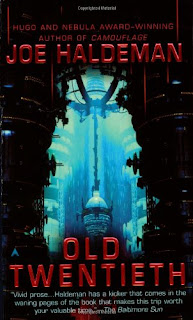
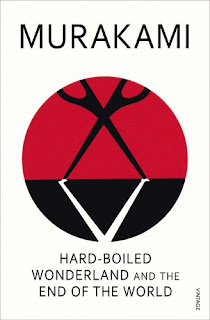



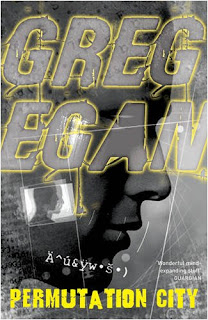



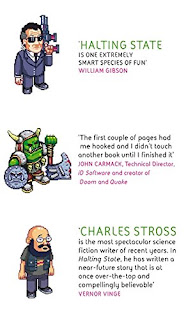
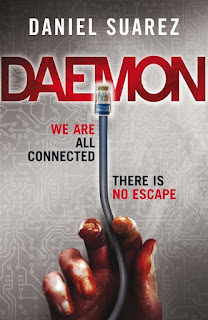
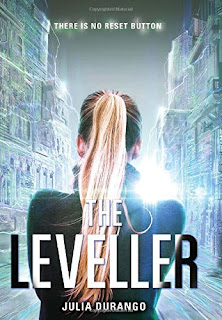
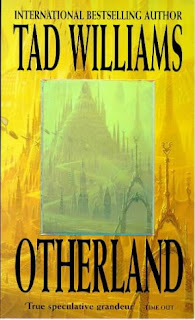
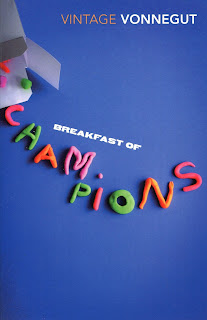



Post a Comment